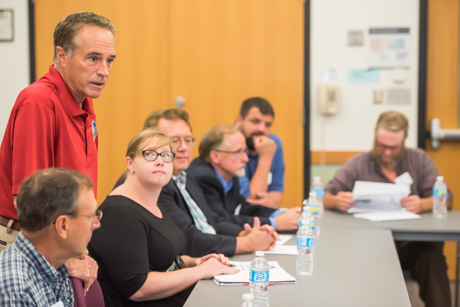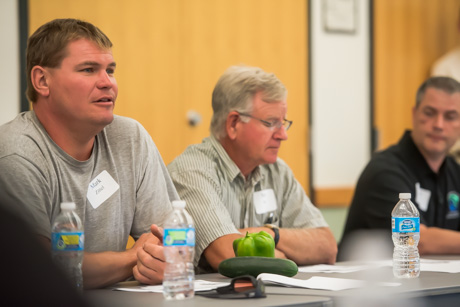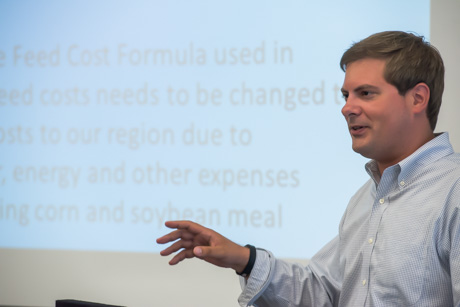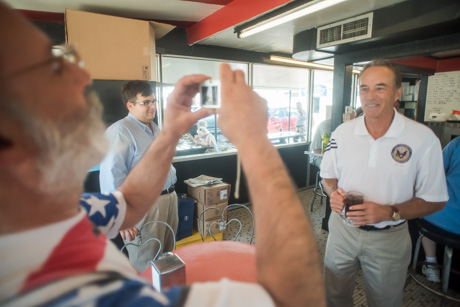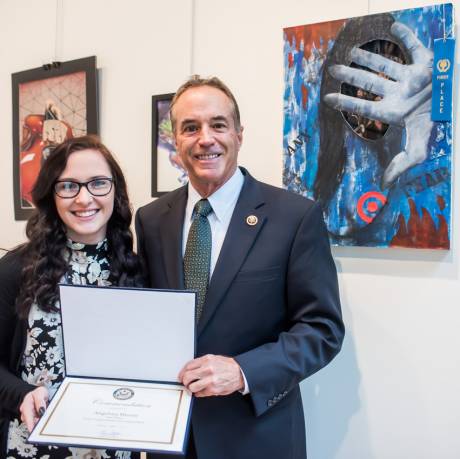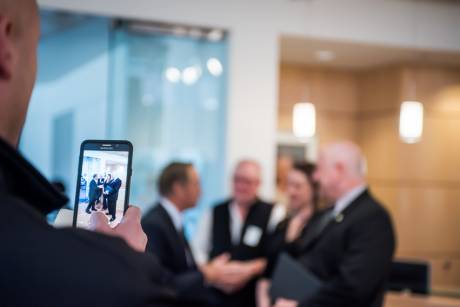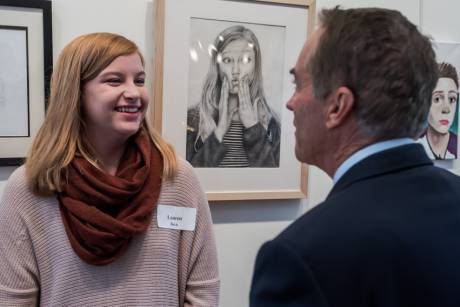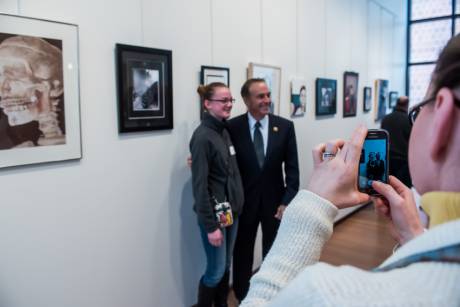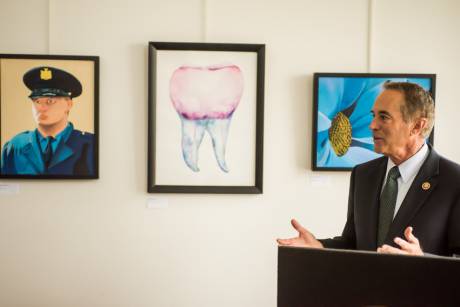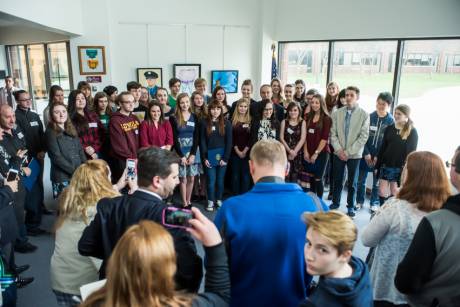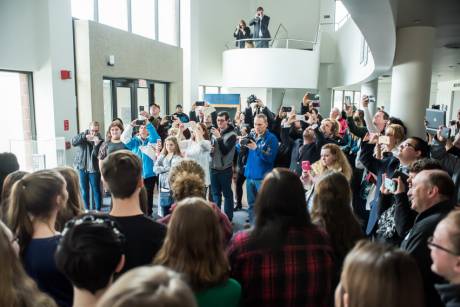Three weeks ago, it could be argued, it looked like Donald Trump had the GOP nomination for president all but locked up.
If he could come across as a bit more presidential, he would likely seal the deal.
Then came a flap about candidates' wives and pictures posted to Twitter, and a statement about punishing women who have illegal abortions, and the campaign started to unravel some.
Even Trump admits he made mistakes.
Trump lost to Ted Cruz in Wisconsin and the fight to secure the nomination has gotten more intense.
The key thing, said Rep. Chris Collins said yesterday at Genesee Community College after handing awards to local high school artists, is that Trump is learning from his mistakes.
Collins is one of only two members of Congress to openly support Trump and is, along with Carl Paladino, Trump's campaign co-chair in New York.
"I can't sugarcoat the last couple of weeks," Collins said. "The fact is, he's laying low right now. He's going to have a big win in New York. That momentum will propel him forward. He's putting together a little more depth on his team.
"I think, perhaps, two weeks ago, the bad week, may have set the stage for him to realize that people are hanging on his every word, every nuance. As a private-sector guy, on the golf course with your buddies, you can say anything you want to say, but not in front of 80 million Americans. I'm proud to support him for all the reasons we stated earlier, and I'm confident he is going to grow from the missteps."
Collins supports Trump because he likes his private-sector background, his business leadership experience, his positions on trade, immigration and foreign policy, but also said some of those positions need some finessing.
"As a guy coming out of our private sector, what are we used to?" Collins said. "Ask me a question and I answer it directly without any other thought. He's had some missteps and I don't agree with him on every issue.
"I certainly would not ban all Muslims, but I would certainly, and have said, we need to make that those who we don't know who they are, whether Syrian refugees or not, we don't know their background, they're not coming here until the director of the FBI can certify who they are. So I'll nuance, perhaps, Mr. Trump's statements in that regard.
"On the immigration issue, I certainly don't think we would ever put 12 million people on a bus and take them back across the border, but we can process the illegal immigrants in a way that (at) the end of the processing it's 'you come in this door, go out that door,' you have legal work papers, a Social Security number. We know you're a law abiding citizen, now you don't have to hide in the shadows. There are nuances to what he's said that I would take the edge off a little."
A recent column in the Chicago Tribune criticized Trump and Bernie Sanders on trade because they seemingly don't understand that a trade deficit in goods makes America stronger because it generates foreign investment and the U.S. benefits from an export surplus in services. A trade war or a trade surplus in goods could be economically disastrous.
Even so, Collins said he thinks Trump understands well the issues around trade and that America needs a trade policy that is fair and levels the playing field.
"If a manufacturer in China or India or Mexico has a 30, 40, 50 percent advantage, we're going to lose all our manufacturing jobs, and every manufacturing job creates five or six other jobs, so what happens with a tariff is we level the playing field and a lot of jobs are going to come back," Collins said.
"We're going to see some inflation," Collins added. "The good news about inflation at a reasonable rate, the debt we have is paid back in cheaper dollars down the road. We do have a goods / trade imbalance. We're going to have a lot more manufacturing.
"The thought that someone else might retaliate...the fact is, we're 25 percent the world's economy and less than 4 percent of the world's population. They want us to be 4 and 4, not 4 and 25. We're going to have to fight to keep 4 and 25. And I would also suggest many of the services and many of the high-tech goods we export are provided because the other countries don't have the ability (to make them) themselves. So they may not like that we're going to make underwear and socks and radios again here, because they want to make it in China and Mexico, but when they need our jet engines and they need our aircraft and they need some of our other service, they're still going to buy them from us because they have no choice.
"To me, that's called a win-win. I hope it's not a trade war. I would say it's leveled the playing field and I would hope through it all, you would have other countries paying better attention to the environment, paying better attention to worker safety, paying better attention to what we would call wages and currency, because if their currency floats, if they're paying higher wages, if they're respecting the environment, if they're respecting workers' safety, then we don't have to (impose) a tariff.
"We're not going to have a tariff with Germany. We're not going to have a tariff with the European countries we are playing with on a level playing field. But if we don't stop the theft of our jobs through unfair trade with Mexico, Vietnam, China and the like, we're going to lose all our jobs."
Trump would be the closest thing the United States has had to a noninterventionist president in any of our lifetimes, and Collins fully supports that vision of foreign policy, he said.
"He is spot on when he says our country, which is broke, $20 trillion in debt, is running deficits and we can't take care of our infrastructure. The thought that we are protecting and watching out for the rest of the world, and they are not paying a fair share, not that we're going to turn a blind eye to atrocities, but let's face it, there are countries taking advantage of America and it's not that we have surpluses," Collins said, "We're running deficits. So I'm 100 percent in line with what he's saying. It is time for them pay their fair share. If we're going to defend them, they're going to pay for it. We can't get involved in every regional conflict. The rest of the world doesn't want us to. It's not our role to play, so I'm 100 percent with Trump on that."
After his recent blunders, Trump has revamped his campaign staff with an eye toward being more strategic about securing delegates. He's put Paul Manafort into a key campaign role to take on that task.
Collins said, as a private-sector guy himself, he understands the need to learn on the job and adjust. Judging how Collins mingled with the high school students and their parents Saturday at GCC, he's grown into the job of Congressman himself. Compared to a couple of years ago, he's much more relaxed and he deftly displayed an individual interest in every student he spoke with.
Trump, Collins said, is learning, will learn and will make sure he's surrounded by nothing but the highest-caliber talent if he occupies the West Wing.
"I come back to the need to have a chief executive in office and there's only one left standing, and that's Donald Trump," Collins said. "Private-sector guy, 40 years experience making tough decisions knowing how to manage people, hiring the best and brightest. I'm convinced he will have the best cabinet that's ever been assembled by a president. There are no hangers-on. There are no retreads. He is going to hire the best people he can hire because they're the best people. He's not going to say are 'You're a Republican, a Democrat. What is your party affiliation? How much money did you give to the party?' That's not Donald Trump.
"It harkens back when I was county executive (in Erie County). When I had to hire my commissioners, all I wanted was the best and brightest who believed in serving the taxpayers, who understood the need for efficiency and the like. After the fact, it turned out, my deputy county executive was a Democrat. It turned out my head of economic development was a Democrat. I didn't ask those questions and neither will Mr. Trump. When it comes back to the president with his cabinet, I think you will have the best ever.
"What does the president do? He sets the 30,000-foot vision, not unlike Ronald Reagan, and this vision is clear. We're going to take our jobs back that were stolen by Mexico and China. We're going to stand tall against foreign adversaries whether it's Russia, North Korea or Iran. We're going to defeat ISIS. We're going to make sure we deal with immigration; keep our borders secure. That's his top-level focus. He's going to have advisors who make all that happen, with him as the conductor and the leader. He's a born leader and that's what we haven't had for seven and a half years."
Whoever becomes president will have a lot of power. If that's Trump, well, Trump has displayed his ego and controlling personality, but Cruz, Clinton and Sanders all might be tempted by the lure of easy executive orders. Asked if Congress should take action before the end of the year to curb the use of executive orders, Collins said he didn't think so.
"Executive orders have always been part and parcel of the executive powers of the president," Collins said. "There are lawsuits and judicial remedies for overstepping, which this president (Obama) has been slapped down on on more than one occasion. I don't really think there is a role for Congress to play other than for the public to understand executive orders are the lay of the land and Hilary Clinton is saying 'If you think Obama did a lot of executive orders, wait until I'm president.' It's a concern, but it's part of history and I think the court system will hold people in check."
NOTE: Chris Collins' views on the issues related to his support of Trump are consistant with what he said to us during his campaign in 2012.

